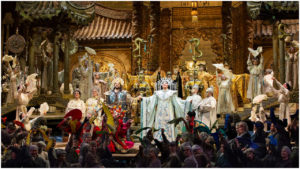
Metropolitan Opera 2019-20 Review: Turandot
Christine Goerke, Yusif Eyvazov & Eleonora Buratto Give Powerful & Sincere Performance
By Logan Martell(Credit: Marty Sohl / Met Opera)
Wednesday, Oct. 9, 2019, saw the third performance of Puccini’s “Turandot,” at the Metropolitan Opera this season. Set against the opulence of Zeffirelli’s 1987 production, the evening’s cast and ample chorus did much in bringing vocal and dramatic vitality to the forefront, with Maestro Yannick Nézet-Séguin making of the most of his particular gifts.
A Powerful Liu
Following the opening execution motif with its five dire chords, the edict sung by Javier Arrey’s Mandarin featured an unsettling and thin texture from the strings, before swelling into something more befitting a royal decree. From the clamor of the ensemble, the lines of Eleonora Buratto’s Liu came forward nicely, emerging from the crowd rather than beginning well above it. Buratto’s affectionate pianissimo made a compelling argument for the lasting affection of her character, with the simple phrase “because you smiled at me.” Buratto shined brightest in Act three, where her exchanges with Goerke bore a sonorous and gentle defiance. Her aria “Tu che di gel sei cinta,” with its dirge-like rhythm, was lit up by Buratto’s vocal leaps, with faltering descents in her lines that conveyed her wounded state. Her bold conclusion was capped off as she stabbed herself with a guard’s knife; the swift gesture was very organic as the determined gaze she had set on Turandot masked her self-sacrificial intent until it was too late.
The fathers of Calaf and Turandot were played by James Morris and Carlo Bosi, respectively. Morris’ brief account of his journey carried wearied tones which, along with the orchestra, bloomed into a new life when Liu entered his story. As the emperor, Bosi’s firm tenor nicely filled the reverent hush which often accompanied his words; under his regal bearing, one could hear the character’s displeasure at the possibility of beheading another prince.
Solid Leads
As Turandot, Christine Goerke marvelously captured the princess as both a merciless ruler, and later a vulnerable woman awakening to love. Her Act two aria “In questa reggia,” bore a strong, iron-like delivery which was contrasted by the dissonant woodwinds evocative of her ancestor’s vengeful spirit. Her sharp, pointing gestures towards Calaf both kept him at bay while thrusting upon him the burden of her cold disdain, wiping her hands as she stepped off the stage’s dais. The gorgeous execution of her blaring, indignant tones skillfully wrapped this number together. Her electric proclamation of the riddles was bolstered by the almost-sinister underscoring of the organ. Once her riddles were solved, Goerke was quickly disrobed by her servants, adding a clear visible element to her newly-founded fragility as well as her freedom from her ancestral trappings. Despite this vulnerability, Goerke’s cries projected well over the ensemble’s powerful demand for her to honor the sacred oath.
In the role of Calaf, Yusif Eyvazov showed great promise. While at times a bit raw vocally, Eyvazov more than compensated with his resolute bearing and attention to characterization. After witnessing the prince’s execution, and then Turandot’s beauty, one could clearly trace the arc of Eyvazov going from fear to infatuation through Calaf’s conflicted phrases; from then on, passionate certainty carried Eyvazov through the night. When entreating Liu to care for his father, he delivered a strong B-flat closing the phrase “Will you do this for one who smiles no more?” As the ensemble reemerged and orchestra built, Eyvazov defied the resounding sense of the crowd, running to the gong and striking it while sustaining his forte cry. When answering Turandot’s riddles, his first two responses came with an unchanging inflection, outdone when claiming victory with the third answer. These emotions were brought to a fervent peak with Eyvazov’s high C in the phrase “No, no, haughty Princess! I want you ardent with love!” His rendition of “Nessun dorma” saw Eyvazov savoring the end of the opening stanza, letting these feelings unfold from within his chest, and seizing the climactic high B to great applause.
A Comical & HeartwarmingTrio
Rounding out the cast were the ministers Ping, Pang, and Pong, played by Alexey Lavrov, Tony Stevenson, and Eduardo Valdes, respectively. Their interpretation was often energetic, lighthearted, and at times comical, seen from their entrance in Act one where they snuck into place to block Calaf from the gong as he sang facing the audience, ready to preempt his passion with blithe, almost distanced, charm. This quality carried through the opening of Act two with their trio “Ola, Pang!” where they gave the idea of a wedding or a funeral the same vocal and emotional hues. A more heartfelt sentiment came shortly with their following number “Ho una casa nell’Honan,” where they pined for their homes in tender counterpoint. With so much of the opera revolving around public spectacle, the ensemble was a highly active participant that did much more than fill the stage as they engaged in brawls, rituals, inquisitions and more. A repeating motif came in how they often reached out in different scenes, such as towards the prince of Persia facing execution, the foggy moon for its light, or Calaf for his final answer. These instances made it all the more impactful when Calaf finally grasped Turandot’s sleeve at the end of the second act.
By no means, a new production, the Met’s “Turandot” remains a powerful contender in its repertory. The splendor of Zeffirelli’s set still draws applause for its breathtaking detail, and Wednesday’s cast proved more than able to draw forth a powerful and sincere performance.



